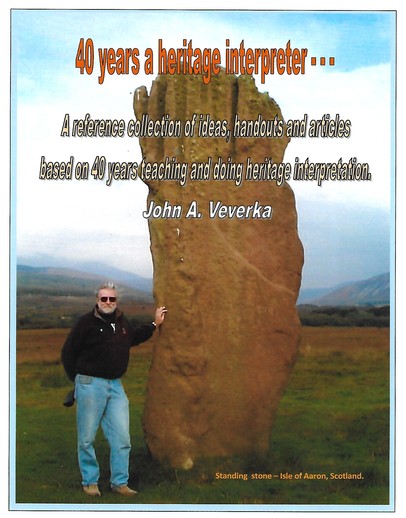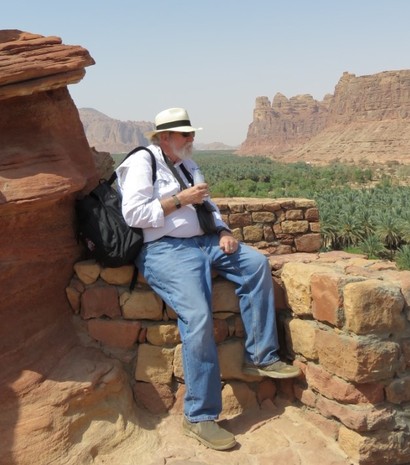John Veverka & Associates
Main menu:
- Home Page
- Our Range of Services
- Interpretive Coaching
- Interpretive Planning
- Interpretive Plan Outline
- Interpretive Training
- John Veverka Resume
- NEW Advanced Interp. Text Book
- InterpNEWS
- Library
- JVA NEWS, Courses and Updates
- Certificates
- Planning/Design of Interpretive Panels
- Interpretive Writing
- Interpretive Writing Course
- Interpretive Trails Course
- Interpretive Panels Course
- Introduction to Heritage Interpretation Course
- Interpretive Planning & Design of Marketing Brochures Course
- Training for Interp. Trainers
- Interpretive Exhibits Course
- Interpretive Master Planning Course
- Interpretive Planning for Scenic Byways.
- Critiquing and Coaching Interpretive Staff
- Advanced Interpretive Planning
- Interpretive Training Center Course Catalogue
- Interp. for International Visitors course.
- Interpretive Exhibits Evaluation
- Interp. Center Feasibility Analysis Course.
- Interp. for Commercial Tour Providers
- Interpretive Researchers Guide for Visitor Studies
- Interp. Planning for Historic Homes
- Heritage Interpretation Training Center
- Interpretive Planning for Botanical Gardens
- An introduction to planning and presenting live interpretive programs and tours for Museum/Heritage Site Docents and Volunteers.
- Developing Marketing Plans for Heritage & Tourism Sites and Attractions
- Interpretation Book Store
- Heritage Interpretation Resource Center
- Interpretive Planning for Historic Farms
- Developing Successful Partnerships
- Developing Interpretive Outreach Programs
- Community Interpretation Planning
- Interpreting Gravestones and Historic Cemeteries
- Using Interpretation to Accomplish Management Objectives.
- An Interpreters Guide for Survival Economics.
- Innovative Strategies for Interpretive Media and Services Planning.
- A Curators Guide for Developing Gallery Tours.
- Advanced Interpretive Writing - Technical Publications
- Advanced Interpretive Services for Managers, Supervisors, Team Leaders and Sr. Staff.
- Advanced Interpretation for Chiefs of Interp. - Interpretive Managers - Regional Interp. Specialists
- Interpreting Critical Issues.
- Developing Commercial Interpretation for Resorts, Cruise Ships, Campgrounds and Tourism Attractions.
- Planning and developing a new commercial tour guiding business.
- Interpretive Evaluation, Visitor Studies and Site Assessment Center
- The Center for Interpretive Planning Advancement & Excellence.
- Developing Requests for Proposals (RFPs)
- Planning and Facilitating Focus Workshops
- Planning for Interpretive Experiences
- 40 Years a Heritage Interpreter
- Interpretive Techniques - The Rest of the Story Course
- Certified Professional Interpretive Planner Certificate
- Certified Professional Interpretive Program
- Certified Professional Interpretive Writer certificate program.
- Visitor motives for attending interpretive programs.
- Exhibit Rehab Course
- Developing Training Workbooks & Manuals
- Planning for Railroad Museums and Sites.
- Climate Change Interpretation Course.
- When there's nothing left but the story - interp. storytelling.
- Interpreting Legends Myths and Fables
- InterpSHARE - Seminars 2022
- Interpreting Invasive Species
- Interpretiing Edible Insects
- Interpretaive Planning for Climate Change
- HITC Climate Crisis Resource Center
- PUP Members Only
- Starting a new Interp Consulting Business
- Panels 4 Week Course
- Interpretive Writing - 4 Week Course
- Marketing - 4 Week Course
- Intro to Interpretation - 4 Week Course
- Interp Climate Change - 4 Week Course
- Exhibit Rehab 4-Week Course
- Level 1
- Johns Interpreters Blog
- John Interpreters Blog 2
40 Years a Heritage Interpreter
The Heritage Interpretation Training Center and
John Veverka & Associates
New Heritage Interpretation Reference Collection.

I am pleased to present Volume I of my reference collection of ideas, handouts and articles based on 40 years of teaching and doing heritage interpretation projects, seminars, training workshops, and having articles published in various interpretive publications. This new book will also be used in our Heritage Interpretation Training Center courses as a main reference manual for articles on a diversity of interpretive course topics
About the author.
Water rest stop - exploring Saudi Arabia Heritage Sites.
John received his B.S.(1976) and M.S.(1978) degrees majoring in Interpretive Services from The Ohio State University, with additional minors in marketing, motivational psychology, and advertising. During this time at OSU, John developed and taught a course on Interpretive Master Planning, was also on the staff of the Ohio State University Museum of Zoology (academic years) and spent five summers as an Interpretive Naturalist with Ohio State Parks. After graduating with his M.S. degree, John was recruited by Alberta Provincial Parks in Canada (1978-1980) as an interpretive planning consultant, where he helped develop interpretive plans for two World Heritage Sites (Head-Smashed-In Buffalo Jump and Dinosaur Provincial Park). In 1981 John returned to Michigan to teach introductory and advanced interpretation courses at Michigan State University, where he was also enrolled in the Ph.D. program (1981-1985). Besides interpretation, John studied recreational learning theory, consumer behavior, recreational marketing and survey research strategies.
He has also been an Adjacent Professor for New York State Universities summer Heritage Tourism Institute, and for North Carolina State Universities summer Heritage Tourism Certificate Program for working tourism professionals. John also created two Heritage Interpretation courses for Newcastle University (England) for their MS global distance learning program in Heritage Management. He lectures widely on Heritage Interpretation and Interpretation Planning, and serves as a consultant to many different agencies and organizations world-wide.
John is the director of the International Heritage Interpretation Group that consists of:
-John Veverka & Associates (Interpretive Planning, Training and Design
Consultancy) www.heritageinterp.com.
-InterpNEWS - the International Heritage Interpretation e-magazine.
-The Heritage Interpretation Training Center (offering 39 college level courses
in introductory and advanced heritage interpretation).
-The Center for Interpretive Planning Advancement & Excellence.
-Interpretive Evaluation, Visitor Studies and Site Assessment Center.
John has been a NAI Certified Interpretive Planner, Certified Interpretive Trainer, and Certified Professional Heritage Interpreter (Canada). He is also a National Association for Interpretation Fellow.
Introduction - 40 + years minus 39 years.
Way back in 1972 after several years in the Army, I was back at The Ohio State University starting to work on a degree majoring in ecology/zoology. The problem was I loved too many different things, archaeology, architecture, cultural heritage sites, museums, zoos, and on and on. As a part of my work study I had a job at the Ohio State University Museum of Zoology working in the malacology department (sea shells). But as this was an academic year appointment I needed a summer job. Thus, the "rest of the story". I saw an advertisement for seasonal naturalists with Ohio State Parks. I applied for a naturalist position and my new lifetime career was born. I worked 5 academic years at the Museum of Zoology and 5 summers as an interpretive naturalist until I graduated, after a change of majors, with my B.S and M.S. in Interpretation in 1978. I was lucky that OSU had interpretation as a major - took all the courses, and even was asked to teach a course in "Interpretive Master Planning" at OSU. Then got recruited to go to Alberta Provincial parks in Canada as an interpretive planning consultant for two years, and then recruited to go to Michigan State University to work on a Ph.D. in interpretation and take over teaching introductory and advanced interpretation courses there for 5 years. I loved consulting work more than teaching at a university, and have been working as an interpretive planner and trainer since then - my 40 years as a heritage interpreter well under way.
This is one of my collections of articles on interpretive theory and philosophy, handouts from some of my interpretive training courses and other interpretive ideas that I developed over the years. Some of these were just written the past year, some are older. The main job of a interpretive professional is to learn all you can about your profession, contribute ideas and theories about your profession, get loads of on-site experience "doing" interpretation, write more about what you learned and then… pass it on to others. So here you go.
Note: It is the intent of this resource to allow other interpreters or interpretive trainers to freely use and copy any of these documents in their own interpretive training and to help advance the interpretive profession. Please reference any documents you may use for these purposes. Use the ideas and information - pass it on. John Veverka.
Copyright 2018, John Veverka & Associates Heritage Interpretation Training Center Resource Manual, April, 2018.
What articles, handout masters or other reference materials are in this collection/library?
Index to articles…
Interpretive theory and principles.
-What is Interpretation? (handout)
-When is "interpretation" NOT "interpretation"?
-A guided tour of the COW museum... A lesson in interpretive theme development.
-Developing Interpretive Plans for Landscape Museums…Thinking LARGE
-Using interpretive themes and objectives will make your program planning
easier and more effective.
-'Is Interpretation Stagnant?
-Experience and Outcome Based Interpretive Planning - Mass Customization,
Markets of One and more… (updated)
-Interpretive Planning for the next millennium.
-Why Heritage Sites Need Interpretation For Their Long Term Survival.
-The Language of Live Interpretation - Making Contact.
Planning for interpretive programs and media.
-Tips and concepts for planning truly "Interpretive" Exhibits.
-Evaluation for Children's Science Museum Exhibits.
-Interpreting Cemeteries and Gravestones.
-Interpretive Tour Guide- Planning and presenting conducted programs Module
-If it Bugs you - eat it !
Interpretation techniques and storytelling.
-Site museums vs. interpretation centers - The story before the artifacts.
-Principles of "Real" Interpretive Writing
-Revealing the "rest of the story" through Art Museum Interpretation...
Why art often needs an interpreter's touch to be really understood.
-Interpreting the "rest of the story" hidden in your artifacts.
-Writing Museum Exhibit Label Copy that is truly "Interpretive".
Planning and contracting for interpretive services.
-Request for Proposal (RFP) - Guidelines and Template Resource Guide For
Interpretive Projects.
-Developing Successful Partnerships.
-Facilitating Focus Workshops for Interpretive Planning Projects.
-Interpreting Critical Issues for Heritage Resource Management.
-Marketing Basics for Interpretive & Heritage Sites and Attractions -
It's all about the visitors.
-Developing Marketing Brochures and Technical Bulletins.
Ordering Information
If you would like a copy, sent to you as a PDF E-book, the cost for the publication is $50.00 USD. You may pay for your copy by using PayPal or Credit Card below. Upon our receipt of your payment a copy of the publication will be sent to you as an e-mail PDF attachment.
As noted above, once you receive your copy it is the intent of this resource book to allow you, other interpreters or interpretive trainers to freely use and copy any of these documents for their own interpretive training and to help advance the interpretive profession. Please reference any documents you may use for these purposes. Use the ideas and information - pass it on, teach others, build on these ideas and references. John Veverka